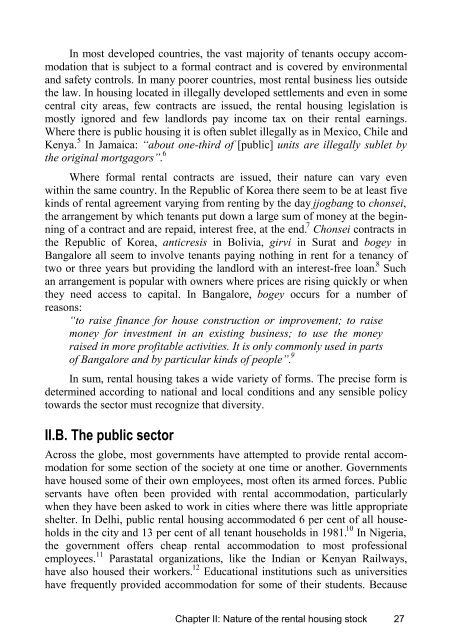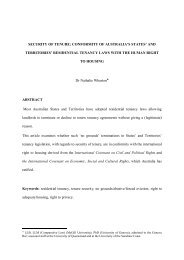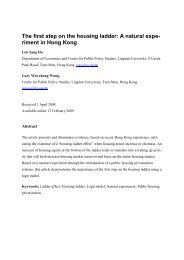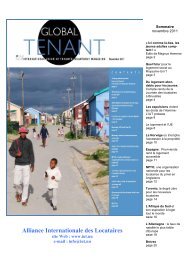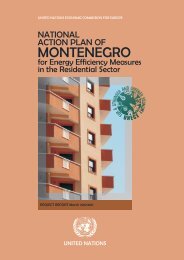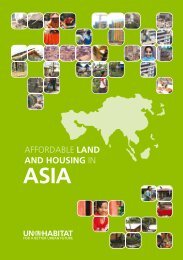- Page 1: Rental HousingAn essential option f
- Page 7 and 8: ContentsPreface ...................
- Page 10 and 11: Table 7. Housing characteristics in
- Page 12: ChonseiCOHREColoniaContingentvaluat
- Page 16 and 17: SlumSocial housingSpontaneoushousin
- Page 18 and 19: xviiiRental housing
- Page 20 and 21: The time of the large, exploitative
- Page 22 and 23: of developing countries, it may eve
- Page 24 and 25: ecognition and focus on rental hous
- Page 26 and 27: to the land on which it is built. A
- Page 29: In short, the report builds on the
- Page 32: Table 2. Housing tenure for selecte
- Page 40 and 41: ownership levels being roughly simi
- Page 42 and 43: uying homes. Informally, and by far
- Page 44 and 45: Notes1. UNCHS, 1989: 1.2. UNCHS, 19
- Page 46 and 47: 24 Rental housing
- Page 50 and 51: of this diversity, this section wil
- Page 52 and 53: numbers of families wanting accommo
- Page 54 and 55: “In Estonia, the public sector ho
- Page 56 and 57: Box 1. Definitions of social housin
- Page 58 and 59: Africa seems intent on developing a
- Page 60 and 61: Boards and the All India Women’s
- Page 62 and 63: “pension funds and life insurance
- Page 64 and 65: Photograph 5: Rental housing in Maf
- Page 66 and 67: II.E. Informal renting of lotsMost
- Page 68 and 69: The situation in Chile and South Af
- Page 70 and 71: Figure 1. Distribution of non-owner
- Page 72 and 73: Notes1. Kumar, 2001: 97.2. UNCHS, 1
- Page 74 and 75: 88. Wahab, 1984.89. Kalim, 1990: 18
- Page 76 and 77: pared with the vast amount of resea
- Page 78 and 79: “In Benin, customarily, the eldes
- Page 80 and 81: The following sections outline the
- Page 82 and 83: one with whom they can share accomm
- Page 84 and 85: Even tenant families are usually sm
- Page 86 and 87: But, the birth of children does not
- Page 88 and 89: drawn between internal and external
- Page 90 and 91: The incidence of sharing is also li
- Page 92 and 93: Many landlords would argue that the
- Page 94 and 95: Notes1. Barrows, 1983: 395.2. Barro
- Page 96 and 97: 87. Chant, 1996a; 1996b.88. Turner,
- Page 98 and 99:
76 Rental housing
- Page 100 and 101:
Kingdom in the mid-1950s, they face
- Page 102 and 103:
dation should be available in good
- Page 104 and 105:
In Mexico, landlords in self-help s
- Page 106 and 107:
More recent Kenyan evidence suggest
- Page 108 and 109:
good, with each title-holder leavin
- Page 110 and 111:
IV.D. Inner-city problemsIn many ci
- Page 112 and 113:
South Africa: “informal landlord-
- Page 114 and 115:
Whether or not evictions are common
- Page 116 and 117:
threat and the Centre on Housing Ri
- Page 118 and 119:
would have been of no advantage to
- Page 120 and 121:
situation. If they can’t pay, I s
- Page 122 and 123:
46. DETR, 2000: 2.47. Aika, 1990: 9
- Page 124 and 125:
102 Rental housing
- Page 126 and 127:
Yet, neither the United Kingdom nor
- Page 128 and 129:
everyone’s little vision isn’t
- Page 130 and 131:
In several cities in much poorer co
- Page 132 and 133:
There are lots of reasons why peopl
- Page 134 and 135:
Making capital gains are often a vi
- Page 136 and 137:
feckless consumers through their su
- Page 138 and 139:
“the peripheral location, the vas
- Page 140 and 141:
the partial exception of a handful
- Page 143 and 144:
poorly constructed, badly maintaine
- Page 145 and 146:
sending money ‘home’, remittanc
- Page 147 and 148:
V.H. Myth 8: ‘Homeownership encou
- Page 149 and 150:
Notes1. Rossi and Weber, 1996: 31.2
- Page 151 and 152:
90. Almarza, 1997; Crespo and other
- Page 153 and 154:
VI. Appropriate forms of public int
- Page 155 and 156:
construction. Unfortunately, while
- Page 157 and 158:
sidies to owner-occupiers through m
- Page 159 and 160:
error of their ways and few are int
- Page 161 and 162:
In Nigeria, there is little formal
- Page 163 and 164:
“relatively low-income households
- Page 165 and 166:
only 23,000 subsidies per annum bet
- Page 167 and 168:
Kumar may argue that sites and serv
- Page 169 and 170:
“the conversion of temporary hous
- Page 171 and 172:
structures is considered to be a fi
- Page 173 and 174:
metres. Some writers have even argu
- Page 175 and 176:
led to the loss of large numbers of
- Page 177 and 178:
Box 4. (continued).in 146 local aut
- Page 179 and 180:
For such reasons, many landlords in
- Page 181 and 182:
Rent control was supposed to help p
- Page 183 and 184:
Box 5. Buy to let in the United Kin
- Page 185 and 186:
“all units listed to voucher hold
- Page 187 and 188:
determine the nature of each and ev
- Page 189 and 190:
Notes1. For details, see UN-HABITAT
- Page 191 and 192:
87. World Bank, 1991: 83.88. Kumar,
- Page 193 and 194:
VII. Promoting rental housing: An i
- Page 195 and 196:
• ‘Every household wants to own
- Page 197 and 198:
discussion. There seem to be two pa
- Page 199 and 200:
nized that “improved security of
- Page 201 and 202:
issues that individual governments
- Page 203 and 204:
Silence about rental housing is als
- Page 205 and 206:
• The impact of upgrading program
- Page 207 and 208:
Notes1. Saunders, 1990: 4.2. UNCHS,
- Page 209 and 210:
List of referencesAaron, H., (1966)
- Page 211 and 212:
Bauer, J.R. and Bell, D.A. (eds.),
- Page 213 and 214:
Crankshaw, O. and Gilbert, A.G., (1
- Page 215 and 216:
——, —— (eds.), (2002), Hold
- Page 217 and 218:
——, (1998), The Latin American
- Page 219 and 220:
Harms, H., (1996), “Conclusiones
- Page 221 and 222:
Kentridge, M., (1996), “The relat
- Page 223 and 224:
—— and Tewari, V.K., (1990),
- Page 225 and 226:
Pareja, M. and San Martín, I., (20
- Page 227 and 228:
Rojas, E., (2001), “The long road
- Page 229 and 230:
——, (1988), The history and pra
- Page 231 and 232:
——, (2003b), Human Settlements
- Page 233 and 234:
Wikan, U., (1990), “Changing hous
- Page 235 and 236:
Appendices: Choice of case studiesT
- Page 237 and 238:
Appendix 1. South African rental ho
- Page 239 and 240:
1999: 2). If there are problems wit
- Page 241 and 242:
They argued that the financial arra
- Page 243 and 244:
Unfortunately, the social housing i
- Page 245 and 246:
“to households who are owners or
- Page 247 and 248:
Appendix 2. Reviving private invest
- Page 249 and 250:
However, because of the weak state
- Page 251 and 252:
issued and then the tenant and the
- Page 253 and 254:
Appendix 3. Leasing: The best of re
- Page 255 and 256:
Unlike an ordinary mortgage, the lu
- Page 257 and 258:
Appendix 4. The accelerated reposse
- Page 259 and 260:
Appendix 5. The rental slums of Ken
- Page 261 and 262:
welcome to the absentee landlords,
- Page 263 and 264:
Appendix 6. The family dimension: S
- Page 265 and 266:
Box 6. (continued).imam’s quarter
- Page 267 and 268:
A second general implication of fam
- Page 269 and 270:
Appendix 7. Is the “American Drea
- Page 271 and 272:
Under such an onslaught it is not s
- Page 273:
proportions of government subsidy p


